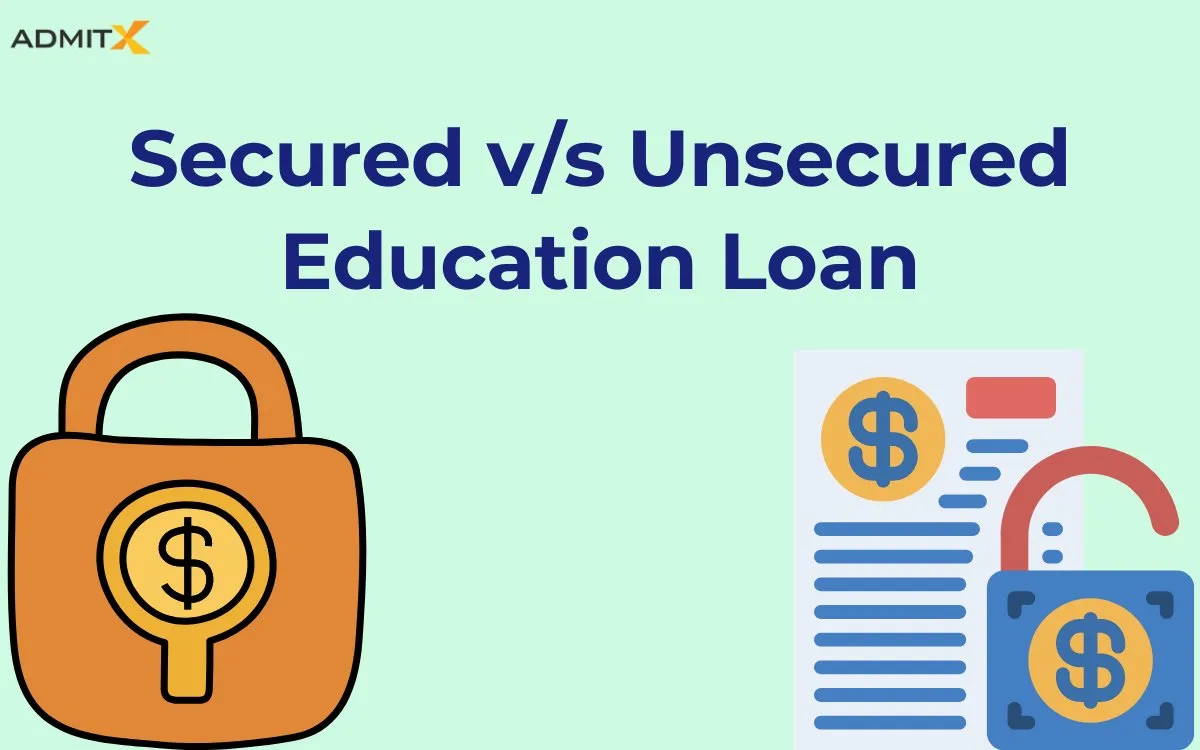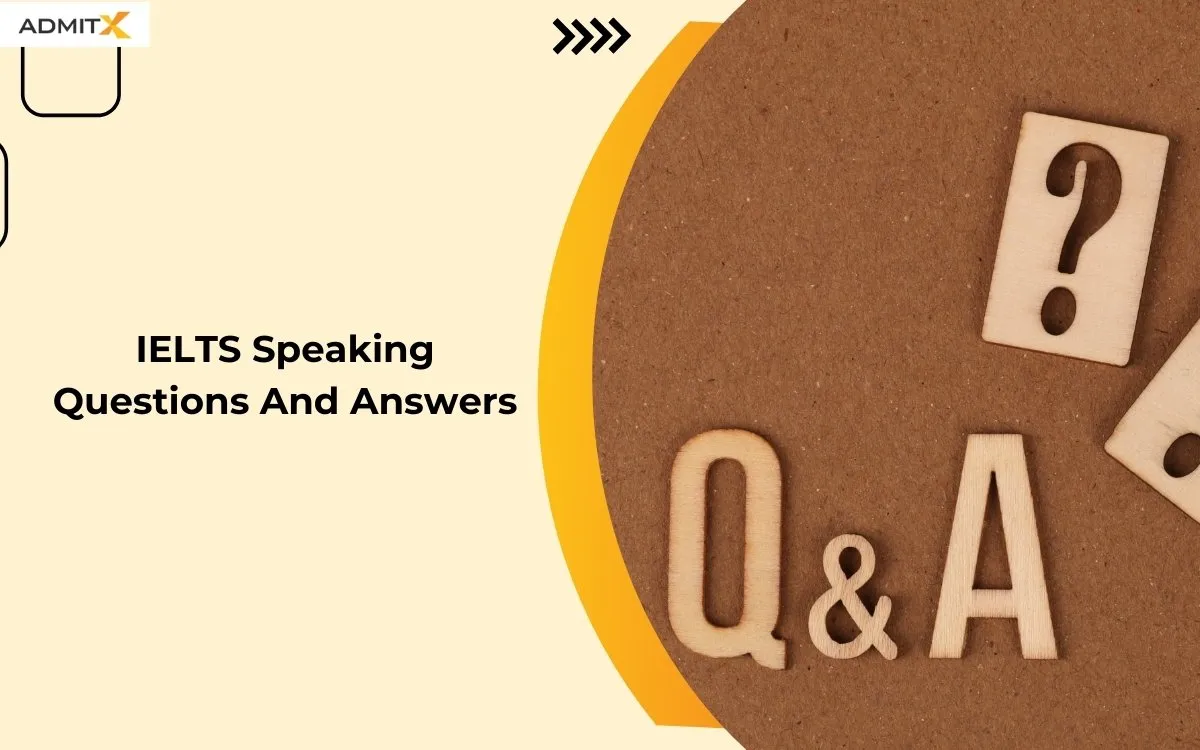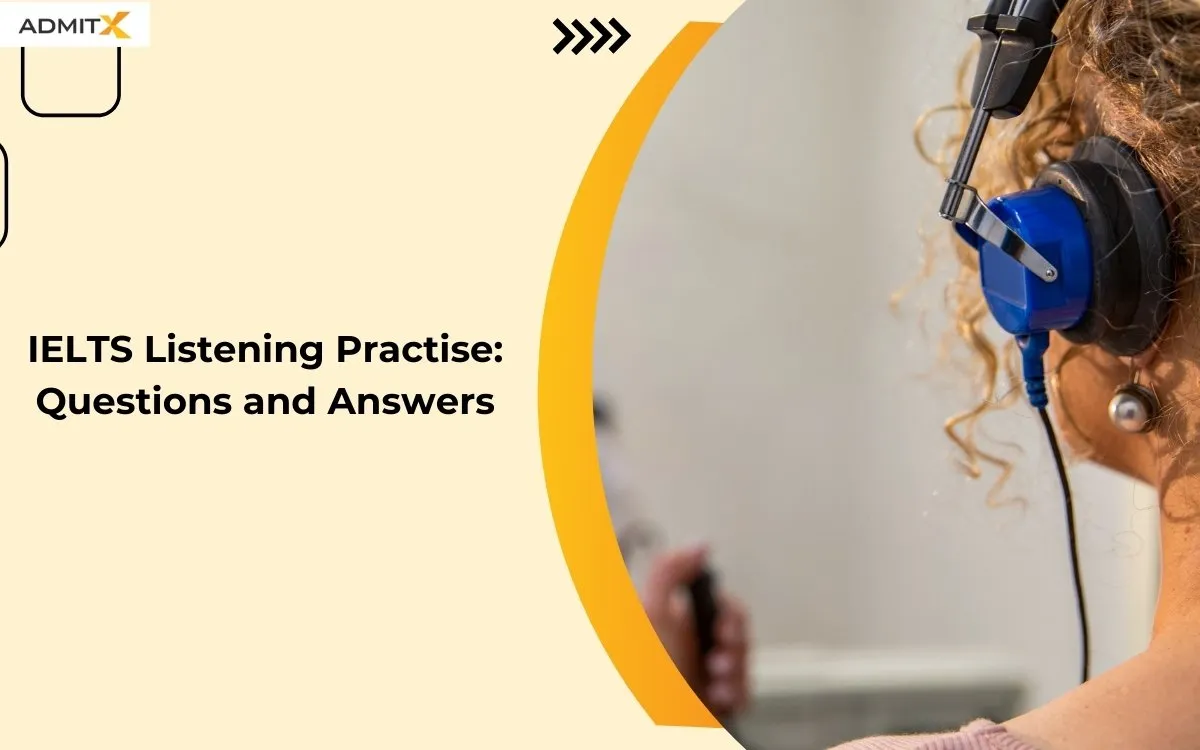
Comparison between Secured & Unsecured Education Loans for Studying Abroad
An education loan gives immense opportunities to students to pursue academic courses in foreign universities. However, before opting for a suitable education loan, they often feel a dilemma about whether to take a collateral and non-collateral education loan. While both have their advantages and drawbacks, they provide sufficient financial coverage for educational expenses.
In this blog, we have discussed the features of both secured and unsecured education loans, including their comparisons, top lenders, and tips to follow before taking an education loan.
- What is a Secured Education Loan?
- What is a Collateral Security for an Education Loan?
- Features of Secured Education Loan
- What is an Unsecured Education Loan?
- Features of Unsecured Education Loan
- Differences between a Secured and an Unsecured Education Loan
- Popular Lenders in India - Secured Education Loans
- Popular Lenders in India - Unsecured Education Loans
- Ways to Choose the Best Type of Loan
- Conclusion
- FAQs
What is a Secured Education Loan?
A secured education loan is a type of education loan that requires students to pledge or lend their security or collateral asset to a bank, financial institution, or authorised lenders. This also known as collateral education loans. This collateral asset may be either movable (tangible collateral) or immovable (intangible collateral). While taking an education loan, the collateral asset is pledged to assure the lender that the repayment of the loan will be made on time.
Otherwise, they have the authority to seize and sell the property to recover the loan amount. The collateral asset acts as a sense of security for the lenders or financial institutions.
What is a Collateral Security for an Education Loan?
A collateral is a valuable asset or property that belongs to the person who wants to borrow the collateral education loan. The market value of such an asset is generally very high, and it is pledged whenever there is a requirement for a higher loan amount for overseas education. It should be noted that in most of the cases, the collateral security for an education loan does not belong to the student legally. While taking a secured education loan, students have to involve their parents/guardians since the collateral security belongs to them.
Types of Collateral Security for an Education Loan
Tangible Collateral Security
Tangible collateral security for an education loan includes an immovable property or asset such as a house, flat, land, agricultural land, plot, etc., with a clearly defined boundary.
Intangible Collateral Security
Intangible collateral security for an education loan includes movable assets such as fixed deposits (FD), insurance policies, government bonds, gold, etc.
The borrower should keep the following points in mind while opting for an intangible secured education loan:
Third-Party Collateral
In some cases, the closest friend or relative can assure the lender about the timely repayment of the secured education loan from the borrower’s side. If the borrower fails to repay, then the third party has to take full responsibility to repay the loan amount.
Why is Collateral Required for a Secured Education Loan?
When it comes to dealing with finances, a lot of risks are involved. For lending institutions, their capital is at stake since it belongs to the general public, and in case of default on a loan, the lender may lose their finances. On the other hand, the borrower also takes a certain degree of risk by pledging their property to get an education loan. In case of failure to repay the loan amount, the financial institution or bank can sell the asset to make a recovery.
Features of Secured Education Loan
Now, it is clear that the collateral education loan includes a lot of risks, such as the risk of losing valuable assets, which many times halts the steps of students and their families to take an education loan. However, taking a secured education loan also provides several benefits, as illustrated below:
- These loans are provided at comparatively lower interest rates since lenders already have partial or full possession of an asset. It facilitates students to repay the loan on time without increasing the extra financial burden.
- Lenders and financial institutions provide secured education loans up to the amount of INR 1.5 Crore, depending on the student’s requirements, the value of the property, and offers.
- The loan tenure of these types of education loans is higher than unsecured education loans. It may vary from 10-15 years, depending on the interest rates, loan amount, and the lender.
- According to the Income Tax Act 1961 and Section 80E, the borrower is liable to get the tax benefits on the interest rate once after the completion of the moratorium period.
- Students get a moratorium period of 6 months-1 year, after which they are required to repay the loan amount.
Also read – Ways to Fund your Overseas Education
What is an Unsecured Education Loan?
A non-collateral education loan is a type of loan that grants financial assistance to students to cover their education expenses without pledging any kind of collateral or security.
These types of loans are quite popular among students since they do not possess any kind of property or valuable asset on their own, also, sometimes, the financial condition of their family is not so good enough to own any property or asset. In such cases, the lender emphasises the following points before granting a loan:
- Extraordinary academic record
- Participation in extracurricular activities/sports activities at the district, state, or national level
- Presence of co-applicant/co-signer (either parents, brother, sister, uncle, spouse, grandparents, etc.)
- Motivation to pursue the course or foreign university
- Future plan after course completion, etc.
Features of Unsecured Education Loan
The following are the significant features and benefits of taking an unsecured education loan for studying abroad:
- Since taking an unsecured education loan does not involve lending or pledging any collateral, students can solely focus on their studies abroad without worrying about them.
- Unlike secured education loans, unsecured education loans are often provided at a competitive interest rate, which facilitates students and co-applicants to plan their finances accordingly.
- One of the greatest benefits of taking an unsecured loan is that the approval process is fast because it does not require scrutiny or evaluation of the property.
- Successful repayment of unsecured education loans improves the CIBIL score of the student. It helps them gain the trust of the lender or financial institution for future financial transaction purposes.
- The repayment tenure of unsecured loans varies between 5-10 years depending on the loan amount, lender, and interest rate.
Differences between a Secured and an Unsecured Education Loan
Below, we have discussed the differences between a secured and an unsecured education loan in a tabulated form:
| Features | Secured Education Loan | Unsecured Education Loan |
|---|---|---|
| Collateral or Security | Tangible or Intangible security is required to get a larger loan amount | No security or collateral is needed to get the education loan |
| Loan Amount | It ranges from INR 20 Lakhs-1 Crore | It ranges from INR 4 Lakhs-70 Lakhs, depending on the lender |
| Interest Rates | Lower interest rates, e.g. 8.25%-11.25% | Higher Interest rates due to risk, e.g. 10.00%-14.00% |
| Requirement of Co-Applicant | Co-applicant is not required | Co-applicant is required in most cases |
| Processing Time | Takes about 20-30 days due to the assessment of collaterals | Takes less time in comparison to a collateral education loan |
| Advantages | Provide tax benefit on interest rate after moratorium period. Improves CIBIL score if repayment is done on time The loan tenure is larger, and flexible repayment options are available | Approval process is fast The loan is provided on a fixed interest rate Co-applicant can provide every kind of possible help to the student if repayment is delayed. |
Popular Lenders in India – Secured Education Loans
Following is a list of popular lenders in India that grant education loans to students.
Public Sector Banks
We have tabulated some popular public sector institutions of India along with the maximum loan amounts and interest rates on which they offer unsecured education loans.
| Lenders | Maximum Loan Amount (INR) | Interest Rate (per year) |
|---|---|---|
| State Bank of India | Upto 1.5 Crore | 8.00% - 10.85% |
| Canara Bank | Upto 1 Crore | 8.25% -10.50% |
| Punjab National Bank | Upto 1 Crore | 9.50% - 11.75% |
| Bank of India | Upto 40 Lakhs | 8.00% -9.25% |
| Indian Bank | Upto 90 Lakhs | 8.50% - 10.00% |
Private Sector Banks
We have tabulated the popular private sector institutions of India along with the maximum loan amounts and interest rates on which they offer education loans.
| Lenders | Maximum Loan Amount (INR) | Interest Rate (per year) |
|---|---|---|
| Axis Bank | Upto 5 Crore | 9.15% - 10.15% |
| Kotak Mahindra Bank | Upto 85 Lakhs | 8.00% - 9.50% |
| IDBI Bank | Upto 90 Lakhs | 8.50% - 9.75% |
| ICICI Bank | Upto 2 Crore | 8.25% - 11.00% |
| Induslnd Bank | Upto 1.5 Crore | 9.14% - 10.75% |
Non-Banking Financial Corporations (NBFCs)
We have tabulated the popular NBFCs along with the interest rates on which they offer secured education loans to students in India.
| Lenders | Maximum Loan Amount (INR) | Interest Rate (per year) |
|---|---|---|
| Avanse | Upto 85 Lakhs | 8.50% - 10.75% |
| HDFC Credila | Upto 1.5 Crore | 10.50% - 11.00% |
| Auxilo | Upto 1 Crore | 9.25% - 10.50% |
| Incred | Upto 1 Crore | 9.50% - 11.25% |
| Eduvanz | Upto 75 Lakhs | 9.00% - 10.50% |
Popular Lenders in India – Unsecured Education Loans
Following is a list of popular lenders in India that grant unsecured education loans to students.
Public Sector Banks – Table
We have tabulated some popular public sector institutions of India along with the maximum loan amounts and interest rates on which they offer unsecured education loans.
| Lenders | Maximum Loan Amount (INR) | Interest Rate (per year) |
|---|---|---|
| State Bank of India | Upto 20 Lakhs | 10.65% - 11.50% |
| Canara Bank | Upto 60 Lakhs | 11.75% -14.50% |
| Punjab National Bank | Upto 70 Lakhs | 9.85% - 14.75% |
| Bank of India | Upto 50 Lakhs | 10.00% -13.75% |
| Indian Bank | Upto 65 Lakhs | 11.25% - 14.50% |
Private Sector Banks – Table
We have tabulated the popular private sector institutions of India along with the maximum loan amounts and interest rates on which they offer unsecured education loans.
| Lenders | Maximum Loan Amount (INR) | Interest Rate (per year) |
|---|---|---|
| Axis Bank | Upto 80 Lakhs | 11.00% - 11.50% |
| Kotak Mahindra Bank | Upto 70 Lakhs | 11.50% - 13.75% |
| IDBI Bank | Upto 75 Lakhs | 10.75% - 13.50% |
| ICICI Bank | Upto 65 Lakhs | 10.25% - 12.50% |
| Induslnd Bank | Upto 45 Lakhs | 11.00% - 13.75% |
Non-Banking Financial Corporations (NBFCs)
We have tabulated the popular NBFCs along with the maximum loan amounts and interest rates on which they offer unsecured education loans.
| Lenders | Maximum Loan Amount (INR) | Interest Rate (per year) |
|---|---|---|
| Avanse | Upto 75 Lakhs | 12.50% - 13.75% |
| HDFC Credila | Upto 80 Lakh | 11.50% - 13.25% |
| Auxilo | Upto 40 Lakhs | 11.25% - 14.50% |
| Incred | Upto 20 Lakhs | 12.50% - 14.25% |
| Eduvanz | Upto 30 Lakhs | 11.00% - 15.50% |
Ways to Choose the Best Type of Loan
If you are considering applying for an education loan, there are several factors you should be aware of to make an informed financing decision. When you apply for education loans in India, here’s what you should consider:
- It is essential for every student desiring to take an education loan to investigate and check whether the course can provide sufficient ROI or return on investment. This is an important aspect to consider very carefully because the repayment of the loan is to be made through future income.
- Estimate the loan amount carefully by calculating the upcoming educational expenses so that unnecessary expenditures can be avoided and the burden to repay the loan can be reduced.
- Check all the terms and conditions of the loan agreement before signing the papers to avoid last-minute surprises. It is always better to have a consultation with a financial advisor before taking an education loan.
- An education loan taken at a comparatively lower interest rate is better because it affects the total repayment cost made after the moratorium period.
- Always look for an education loan that provides flexible repayment options.
- Consider and discuss the additional charges, such as processing fees, prepayment charges, and penalties for late payment with the lender because these could add up and affect the total repayment cost of your education loan.
Conclusion
An education loan is a form of financial assistance from lenders such as banks, NBFCs, and other authorities that promote education for all. There are broadly two types of education loans, secured and unsecured. Secured education loans are also called collateral education loans, offered at lower interest rates since they involve the pledging of security.
Unsecured education loans are called non-collateral loans because it doesn’t require lending any type of security. While both have their advantages, it should be remembered that several factors, such as interest rate, moratorium period, loan tenure, repayment options, etc., should be considered before taking an education loan.
FAQs
Which is better, a secured or unsecured education loan?
It wholly depends on the borrower to choose between collateral and non-collateral education loans. If you do not have significant assets to offer in exchange for an education loan, then go for this type of loan, which is generally offered at a slightly higher interest rate but also provides flexible repayment options.
How long do secured education loans have to be repaid?
The average loan tenure for collateral or secured education loans varies between 8-15 years depending on the loan amount, interest rate, and the lender. In some of the cases, lenders can extend the loan tenure upto 30 years.
Does the academic record of the student matter while taking a secured education loan?
No, in such cases, lenders are more concerned about evaluating the market value of the collateral and income of the parents rather than considering the student’s academic record as the eligibility criteria.
If you are an aspirant looking to study at your dream university, book an appointment with AdmitX today and start your applications early to avail yourself of all the benefits.








